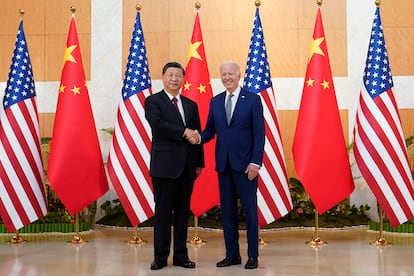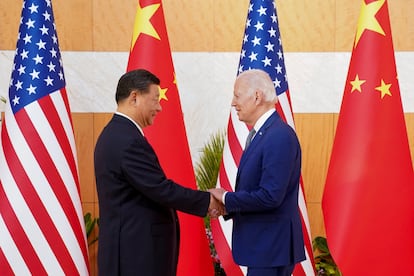Biden: ‘I absolutely believe there need not be a new Cold War’
In the first face-to-face meeting between the US president and Chinese leader Xi Jinping since the 2020 elections, Taiwan, North Korea and trade issues were on the table

Preventing competition between the United States and China from turning into confrontation is, in terms of international relations, the central issue of the 21st century. The leaders of the world’s two major powers met on Monday in Bali ahead of the G20 summit, the first face-to-face encounter between the two since Joe Biden assumed the US presidency. Before starting the meeting, Biden and his Chinese counterpart, Xi Jinping, cordially shook hands and expressed their willingness to work to improve a relationship which, according to many experts, is at its tensest since the normalization of diplomatic ties between the countries in the 1970s.
“As the leaders of our two nations, we share a responsibility, in my view, to show that China and the United States can manage our differences, prevent competition from becoming anything ever near conflict, and to find ways to work together on urgent global issues that require our mutual cooperation,” Biden stated.
For his part, the Chinese leader said the current situation in which Sino-US relations finds itself “is not the fundamental interests of our two countries and peoples and it is not what the international community expects [of] us. As leaders of the two major countries, we need to chart the right course for the China-US relationship. We need to find the right direction for the bilateral relationship going forward and elevate the relationship.”
But simple expressions of goodwill will do little to dispel doubts over the future of that relationship. China-US relations reached a previously unknown level of tension over Taiwan following the visit of US House Speaker Nancy Pelosi, a gesture that Beijing viewed as provocative. The most tangible outcome of the bilateral meeting was a mandate for the two administrations to strengthen dialogue in critical and problematic areas. This includes climate change, with a commitment to “cooperate for the success of COP27″, according to Beijing’s account of the meeting between the two leaders.
The re-establishment of dialogue on the climate crisis is undoubtedly a step in that direction but it does not address the underlying problems between the superpowers. The Taiwan issue is a clear illustration of this. Xi made it abundantly clear that Taiwan is “the first red line that must not be crossed in China-U.S. relations.” In turn, Biden, according to a White House statement, denounced China’s “increasingly aggressive actions toward Taiwan.”
However, in response to questions from reporters at a press conference after his meeting with Xi, the US president underlined that he does not believe there is “any imminent attempt on the part of China to invade Taiwan.” while emphasizing that Washington’s “policy in Taiwan has not changed at all [...] I made it clear that we want to see cross-strait issues peacefully resolved.” However, in recent months, Biden has broken with diplomatic tradition by being very explicit in saying, on at least four occasions, that he is prepared to deploy US force to defend Taiwan against an unprovoked attack. “I absolutely believe there need not be a new Cold War,” Biden said Tuesday.

Biden calls on China to rein in North Korea
The US has also called on China to try to rein in North Korea’s nuclear weapons program, an issue that is of utmost concern to its allies in the region such as South Korea and Japan. Biden said at the press conference that he “thought [China] had an obligation to attempt to make it clear to North Korea that they should not engage in long-range nuclear tests,” adding that if Pyongyang did engage in such a course of action, the US “would have to take certain actions that would be more defensive on our behalf.”
China, for its part, believes the US is attempting to contain its economic rise. “Suppression and containment will only strengthen the will of the Chinese people,” Xi told his counterpart, according to a statement from the Chinese Foreign Ministry as cited by Bloomberg. “Starting a trade war or a technology war, building walls and barriers, and pushing for decoupling and severing supply chains run counter to the principles of market economy and undermine international trade rules. Such attempts serve no one’s interests.”
Biden arrived in Bali politically reinforced by better-than-expected results for the Democrats in the legislative elections and with the asset of the show of united force among the US’ network of alliances and the Ukrainian victory in Kherson, where Russia’s forces retreated from the only provincial capital captured since the Kremlin launched its invasion on February 24.
China will undoubtedly have taken note of the Western reaction in terms of financial and military aid to Kyiv, as well as sanctions imposed upon Moscow. Beijing may also be reflecting on how a modernized and, on paper, fearsome military power such as Russia has proven fragile and incapable of stopping a Ukrainian counter-offensive that, regardless of the motivation of its troops and intelligence support from NATO, is fighting with relatively modest weapons supplies from Kyiv’s Western allies.
Xi, for his part, also arrived strengthened by his recent coronation at the Chinese Communist Party congress, which not only gave him a third presidential term but also configured a leadership structure completely tailored to the Chinese leader. However, despite decades of powerful and effective progress in multiple areas, including primary strategic fields such as technology and the military, China is experiencing an economic slowdown, facing persistent problems in coping with the coronavirus pandemic and finding its commitment to its relationship with Moscow increasingly uncomfortable.
Tu suscripción se está usando en otro dispositivo
¿Quieres añadir otro usuario a tu suscripción?
Si continúas leyendo en este dispositivo, no se podrá leer en el otro.
FlechaTu suscripción se está usando en otro dispositivo y solo puedes acceder a EL PAÍS desde un dispositivo a la vez.
Si quieres compartir tu cuenta, cambia tu suscripción a la modalidad Premium, así podrás añadir otro usuario. Cada uno accederá con su propia cuenta de email, lo que os permitirá personalizar vuestra experiencia en EL PAÍS.
¿Tienes una suscripción de empresa? Accede aquí para contratar más cuentas.
En el caso de no saber quién está usando tu cuenta, te recomendamos cambiar tu contraseña aquí.
Si decides continuar compartiendo tu cuenta, este mensaje se mostrará en tu dispositivo y en el de la otra persona que está usando tu cuenta de forma indefinida, afectando a tu experiencia de lectura. Puedes consultar aquí los términos y condiciones de la suscripción digital.









































